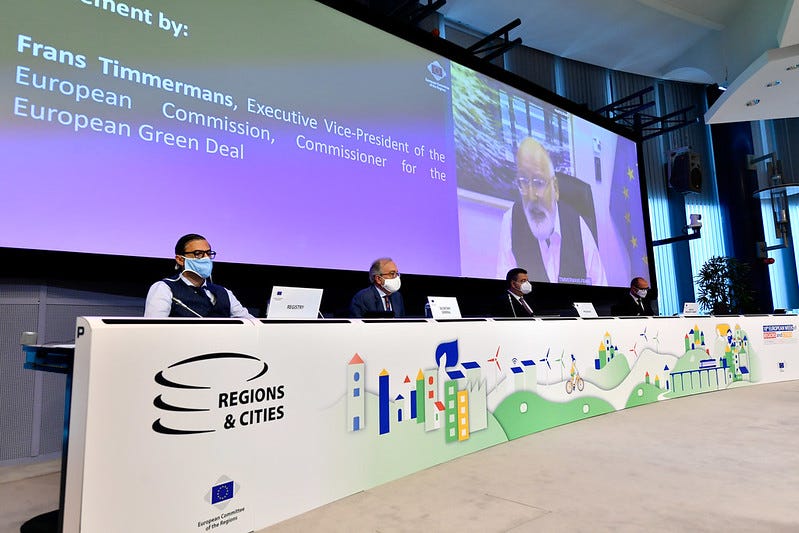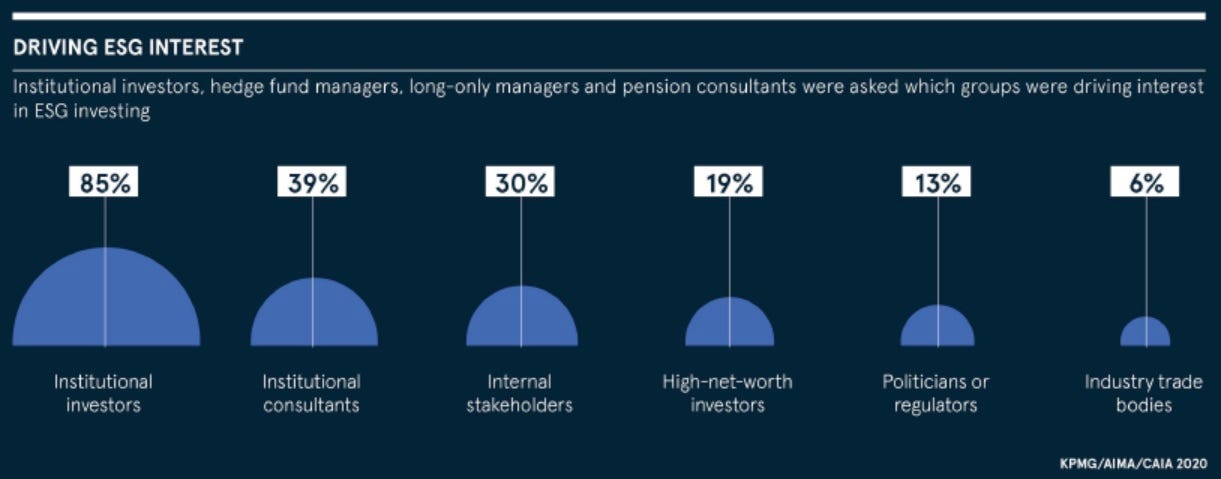Biden takes climate stage, EU's hydrogen politics, and carbon trading with ICE's Gordon Bennett
Plus, what Deutsche Bank's climate pay plan means for Wall Street, and battery wars and SPAC stocks

President-elect Joe Biden won’t speak at this Saturday’s Climate Ambition Summit, hosted virtually by the UK in place of what was to be the Cop26 global summit in Glasgow. But in a sense he is taking the stage, as America’s return to the climate table highlights a flurry of new climate commitments by countries expected in the next 72 hours.
The list of countries presenting during the summit is exhaustive, and some reports suggest the British are being puckish in who they give the floor to, after making a major pledge just last week and also as they face a momentous Brexit deadline with the European Union before the end of the year. For the U.S.’s part, Los Angeles Mayor Eric Garcetti is scheduled to represent.
It’s possible the next 48 hours could see more appointments to the Biden climate team ahead of the summit, following John Kerry and Brian Deese, as well as updates from as many as three dozen countries to their climate goals, as promised in the Paris Agreement by the end of 2020.
Still, with global temperatures hovering at 1.2°C. above pre-industrial levels, closing in on the 1.5°C. Paris threshold, and a new wildfire season just starting in Australia, it’s hard to see the summit as anything more than a grand, political echo-chamber.
The real work, if it can get done, is still very much ahead of us.
More insights below. . . .
. . . . Note to subscribers: The growth of Callaway Climate Insights has been strong this year, and anecdotally we’ve received a number of compliments for our coverage, from investing, policy and politics, to stunning climate data and quirky animal stories. As we prepare to go daily and turn this into a real business in the new year, we’d like to hear your thoughts on what you like best. Please take two minutes and fill out this short survey. We appreciate it. . . .
Don’t forget to contact me directly if you have suggestions or ideas at dcallaway@callawayclimateinsights.com.
EU notebook: The politics of Europe’s vision for a hydrogen-fueled future
. . . . As the European Union inched toward a deal for its 2030 climate goals this week, the debate began to shift to the politics of a green transition, writes Stephen Rae from Dublin. Real differences among member states in how they quickly they move to renewable energy from coal, gas and even nuclear energy create the need for a flexible timeline for different countries to work out their challenges, including financial ones. One thing almost all members agree on though, is that hydrogen fuel is the future. How they get there collectively will be the challenge. In this piece, we analyze the debate between blue and green carbon, and examine the variety of routes officials think they’ll need to make it happen. . . .
ZEUS: Expanding cap and trade with ICE's Gordon Bennett
. . . . “Energy transitions are constant,” wrote Gordon Bennett, managing director of utility markets for the Intercontinental Exchange, in a recent treatise on energy trading. An obvious statement, maybe, but one at the heart of the global debate on how to wean industrialized nations off fossil fuels, writes David Callaway. The exchange, known as ICE, offers contracts in the three largest carbon markets in the world, and has seen record trading in the past month. As Europe moves closer to a climate plan and the Biden Administration re-takes a seat at the global climate table, the need for a global carbon market is becoming more real. In an interview from London, Bennett discusses how past changes in energy trading might pave the way for an international cap-and-trade scheme. . . .
EU climate chief Frans Timmermans webinar with Callaway Climate Insights next month
. . . . In an exclusive for Callaway Climate Insights subscribers, European Union Climate Commissioner Frans Timmermans will participate in a webinar next month to discuss Europe’s energy transition goals for 2030 and how it is working with the incoming Biden Administration on the climate emergency. Timmermans is one of the most influential climate leaders on the globe — a straight talker who will share his insights on transatlantic deals, how corporations can respond to the climate crisis, and public-private partnerships. The webinar on Jan. 21 will also feature a Q&A session for subscribers to ask their own questions. Read more. . . .
. . . . The green move on Wall Street continued to make its way from the marketing department to payroll this week as Deutsche Bank joined a select few other investment banks willing to tie their management compensation to climate criteria. Deutsche joins HSBC and BNC Paribas, one of the European leaders in climate initiatives, in tying compensation to performance on climate. Managers will be measured on the bank’s ability to reach sustainability targets, and to their contribution to the bank’s own energy consumption savings. As bonus season this year will reflect the surge in financial markets, IPOs, SPACs, and other deals, this seems an easy way to generate good climate karma in 2021 and potentially lure some of the rising tide of ESG money hitting the market. Especially if they are only tying a minority of pay to the initiatives, which appears the case. Expect to see more of this. . . .
. . . . The decision by New York’s $226 billion state pension pension fund to divest all fossil fuel stocks in the next five years is the most aggressive divestment by a major player to date, though the five-year timeline gives it ample opportunity to weigh the potential for a rebound in oil stocks to its fiduciary promises to retirees. More confusing is the promise to divest stocks of any company contributing to climate change by 2040. That would seem to be, uh, all of them. But state comptroller Thomas DiNapoli deserves credit for acknowledging that climate change is a greater risk to the long-term value of the fund than the threat of missing a rally. These funds tend to move in packs. Expect to see a few more of these early in the New Year. . . .
. . . . Battery wars rocked shares of newly-issued SPAC Quantumscape (QS) this week, with shares rising more than 20% on Wednesday on news the Volkswagen-backed company’s lithium batteries could recharge up to 80% in just 15 minutes. But shares opened more than 7% lower on Thursday after Toyota (TM) announced plans for a competing solid-state battery next year. The shares were last trading down 3%, indicating some investors saw the dip as a buying opportunity. Given the opportunities in the battery arms race going forward, this looks like a smart move. . . .
. . . . Another week, another activist going after Exxon Mobil (XOM), whose shares are down almost 40% year-to-date. But the bid by Engine No. 1, a new investment firm, seems timely given the awakening of several big pension funds this year to ESG strategies. Reports that the California State Teachers’ Retirement System, known as CalSTRS, supports it lends heft to what would otherwise be considered a nuisance bid, and could stir some internal debate on the company’s renewable plans. Especially since rival Royal Dutch Shell (RDS.A) lost several key clean energy executives recently amid a similar debate. . . .
Data driven: What’s driving ESG interest
. . . . Against all odds, sustainable investing in the U.S. smashed records in 2020, Iman Ghosh reports for Visual Capitalist. In 5 Drivers Behind the Sustainable Investing Shift, Ghosh reports that estimated net flows reached $20.9 billion in the first six months alone — that’s nearly equal to the amount of new money invested in all of 2019. What is driving the shift to sustainable investing? See this visual dashboard (detail above) explaining five key drivers, from generational shifts to investors’ preferred strategies. . . .
News briefs: Everest rises, money and tech for SDGs, more

Everest is even taller than we thought: China and Nepal this week, after years of talks and surveying work, announced a revision to the elevation of Mount Everest: Officials say the summit now stands precisely at 8,848.86 meters, or 29,031.69 feet above sea level, according to a report from NPR. That makes the official measurement more than two feet taller than the consensus had it on Monday.
Editor’s picks:
Money and tech help in achieving sustainable development goals
House passes $9.9 billion water resources bill
Environmental damage caused by mining for lithium
Latest findings: New research, studies and projects
Effective carbon prices and sub-global climate cooperation
From the abstract: Scholarly and policy interest in carbon pricing coalitions is growing. Existing research analyzes design features that can increase the environmental effectiveness and political resilience of coalitions centered around carbon taxes and carbon markets (i.e. explicit carbon pricing). This article is the first that analyzes the advantages and disadvantages of building carbon pricing coalitions around effective carbon pricing compared to the standard design that focuses on explicit carbon pricing. Measures of effective carbon prices include carbon prices implemented via carbon taxes, carbon markets, fuel taxes, and fossil fuel subsidies reforms. The article describes four design options to build carbon pricing coalitions — three built on measures of effective carbon pricing and one that focuses exclusively on explicit carbon pricing — and benchmarks them against five criteria. The key results are that building carbon pricing coalitions around effective carbon prices has various advantages over the most common alternative discussed in the literature. These advantages include higher transparency, potential greater breadth and legitimacy of the coalition, and a more substantial involvement of Finance Ministries in climate change mitigation. These advantages might translate into comparable or even higher environmental effectiveness than coalitions that focus exclusively on explicit carbon pricing. Author: Goran Dominioni, Dublin City University School of Law and Government. Available at SSRN.
More on the latest research:
Words to live by . . . .
“The clear and present danger of climate change means we cannot burn our way to prosperity. We already rely too heavily on fossil fuels. We need to find a new, sustainable path to the future we want. We need a clean industrial revolution.” — Former UN Secretary-General Ban Ki-moon.







